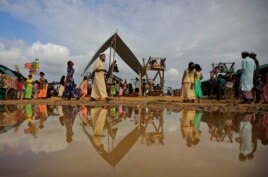22 August, 2018
Hundreds of thousands of Rohingya refugees in Bangladesh celebrated the Muslim holiday of Eid al-Adha on Wednesday. The refugees prayed for better lives and wondered if they will ever go back to their homes in Myanmar.
The calls to prayer came early in the large refugee camps. People lined up in temporary structures used as mosques. Children with newly washed clothes watched from a window.
The four-day holiday of Eid al-Adha celebrates the Prophet Ibrahim and his willingness to sacrifice his son. Muslims often kill sheep, cattle or goats on the holiday. Some of the meat is distributed to the poor. But the refugees in this camp are the poor and few gave such gifts.

Rohingya refugees are reflected in a puddle during Eid al Adha celebration at Kutupalong refugee camp, Bangladesh, Wednesday, Aug. 22, 2018.
The Muslim Rohingyas have faced generations of discrimination in largely Buddhist Myanmar. They are denied citizenship rights, attacked and sometimes not able to practice their religion.
"We could not pray during Eid in my village for years, we had to pray secretly," said refugee Nurul Alam. "I have freedom here, but I don't want it here."
"We don't belong here," he continued. "It's good that nobody is coming to kill us, but I want to go back where my parents' graves are located."
More than 700,000 Rohingyas entered Bangladesh last year. They are fleeing a campaign of destruction by the Myanmar military and Buddhist mobs. The campaign followed attacks by a Rohingya rebel group.
Thousands of people are believed to have been killed in the attacks by the Myanmar military. Rights activists believe it was the government's attempt to drive the Rohyngya from the country.
Many in Buddhist-majority Myanmar see the Muslim Rohingyas as illegal migrants from Bangladesh. They call them "Bengalis." Most have long lived in poverty in Myanmar's Rakhine state, next to Bangladesh.
The events of the past year have made for a sad Eid al-Adha.
"We are happy, but again we are not happy, said 60-year-old Shamsul Alam as he walked to a mosque for prayers. "I had my land...Here I don't have any problem for food, but I don't have what I need."
"I am nobody here," he said.
I'm Susan Shand.
Susan Shand adapted this story for Learning English based on the Associated Press report. Hai Do was the editor.
_______________________________________________________________
Words in This Story
mosque – n. a building that is used for Muslim religious service
practice – v. to live according to the customs and teachings of a religion
grave – n. the place where a person is buried after death